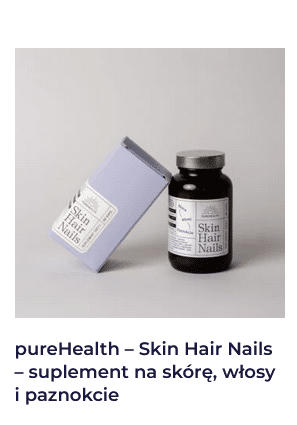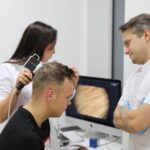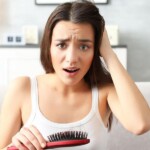Are you wondering what to use for hair loss? A deficiency of vitamins and minerals can significantly weaken the body and affect the density and condition of your hair. Hair loss should be approached comprehensively: identify its cause, treat it, and prevent it. Supplements and vitamins, easily available at the pharmacy, can help maintain or restore healthy hair condition. Remember, however, that this is not a causal treatment for hair loss.
A good solution is to adopt a healthy diet rich in vitamins and minerals, as well as consume beneficial herbs. Homemade masks are also recommended, as they help strengthen, nourish, and stimulate hair growth. Recently, hair oiling has become popular, as it helps retain moisture within the hair. There are many medical and natural methods that can strengthen hair and reduce shedding.
What are the causes of hair loss?
One of the most common causes of hair loss is androgenetic alopecia. This condition is due to hair follicles being overly sensitive to male hormones. Hair follicles become weakened and dull. Hair falls out faster, while new follicles appear much more slowly or not at all. This leads to thinning and general weakening of the hair. Genetics, overall health, and lifestyle also affect the condition of the hair. Hair loss is a natural process in the body, but when more than 100 hairs are lost daily, it becomes excessive shedding that requires diagnosis and treatment.
Sudden hair loss may be the body’s reaction to long-term or intense stress. Doctors also point to other causes, such as deficiencies of micronutrients and macronutrients like zinc or iron. Hormonal disorders (e.g., thyroid overactivity or underactivity) are another major factor. Fungal scalp infections or seborrheic dermatitis may also contribute. The use of certain medications – such as chemotherapy, contraceptives, or anticoagulants – can also weaken hair.
An improper diet has a big influence on hair health. Avoid sugar and highly processed foods. Your diet should be rich in vitamins, minerals, and adequate protein. Daily styling practices can also cause hair loss – frequent dyeing, strong cosmetics, or tightly tying hair weakens follicles. Doctors also recommend avoiding high temperatures when blow-drying. Learn more here: Hair loss – causes, diagnosis, and effective solutions.
Hair loss tablets – which to choose?
If you notice excessive hair loss, you should consult a doctor. The specialist will investigate the cause and begin treatment. Depending on the reason, different therapies are applied. If hormonal imbalance is the cause, treatment to restore hormone levels is necessary. Nutritional deficiencies should be corrected with diet or medication. Pharmaceutical companies also offer modern tablets for hair regrowth – the right choice should always be made by an experienced physician.

Aminexil and Minoxidil
Among the most popular hair loss treatments recommended by doctors are Aminexil and Minoxidil. Aminexil, an ingredient in scalp lotions, improves scalp circulation and nourishes follicles, helping to prevent hair loss and deliver nutrients. Minoxidil works similarly and is also available in ampoules. It can reverse alopecia effects relatively quickly but must be used consistently for effectiveness.
For men, many doctors recommend Finasteride (available by prescription only), which inhibits production of the male hormone DHT.
Which vitamins and supplements for hair loss?
Dietary supplements can support the fight against hair thinning. Pharmacy-available supplements often contain vitamins, minerals, and herbs. Vitamins and minerals play a key role in hair health, but ideally should be obtained from a balanced diet. Still, supplementation may help. Vitamin A regulates sebum production, while B vitamins improve hair condition. Vitamins C and E improve scalp blood flow, ensuring better oxygenation and nourishment, which promotes growth and shine. More about vitamins: Vitamins for strengthening hair and preventing hair loss.
Iron, chromium, and copper
Iron, chromium, and copper also help strengthen hair. Iron, absorbed into hemoglobin, carries oxygen to tissues, essential for hair growth. Proper absorption requires a complex process involving enzymes and vitamins. Calcium and magnesium also play roles in preventing hair loss. However, both deficiency and excess of vitamins/minerals can be harmful.
The role of macronutrients: zinc, sulfur, and selenium
Macronutrients are essential elements making up at least 0.01% of body mass. Zinc regulates amino acid metabolism and keratin production. Its deficiency weakens immunity and hair structure. Zinc is found in oysters, beef liver, turkey, onions, and peas.
Sulfur strengthens hair, nails, and skin, being a key keratin component. Found in eggs, nuts, legumes, avocados, and tomatoes, sulfur prevents brittleness and supports regeneration.
Selenium, together with vitamin E, protects hair from UV damage, prevents dryness, and supports thyroid function. Found in pumpkin seeds, Brazil nuts, cod, tuna, and grains.
Methionine, cystine, and biotin
- Methionine stimulates hair growth, supports follicles, aids detoxification, and regulates the nervous and muscular systems. Found in protein-rich foods like fish, eggs, cereals, and legumes. Widely used in supplements and cosmetics.
- Cystine, a keratin-building amino acid, strengthens hair shafts. It supports detoxification and is a powerful antioxidant. Used in hair products, it reduces shedding and promotes regrowth.
- Biotin (the “beauty vitamin”) nourishes hair, stimulates growth, strengthens nails, and regulates sebum. Deficiency leads to fatigue, weakness, and hair loss. Found in liver, egg yolks, soy, and whole grains, but often requires supplementation.

Herbs for strengthening hair
Weakened hair can also be supported with herbs. Horsetail, rich in silica, strengthens and improves elasticity. Horsetail prevents graying, split ends, and breakage. Rosemary offers antioxidants, while birch has anti-inflammatory properties. Nettle regulates sebum and reduces DHT activity. Lavender improves circulation, chamomile soothes irritation, and ginseng boosts metabolism. Herbal remedies nourish the scalp and strengthen hair.
Read more: Which herbs help with growth and which with hair loss?
What to use for hair loss?
Looking for an effective anti-hair-loss treatment? In prevention, lifestyle is crucial. Avoid stress, follow a healthy routine, and use natural cosmetics without harsh chemicals or alcohol. Wash with lukewarm water, avoid hot dryers, straighteners, and heavy sprays. Scalp massage improves circulation and follicle nourishment. Limit smoking and excess caffeine. Proper hydration and regular trimming also help.
Hair care tips
A balanced diet is key – reduce coffee, replace sugar with xylitol, erythritol, or stevia. Eat antioxidant-rich vegetables and omega-3 fatty acids from fatty fish. Beef provides protein, zinc, and iron.
Diet for hair loss
Whole-grain bread, brown rice, lean proteins, and healthy oils (linseed, rapeseed, olive) all benefit hair. Gelatin is particularly useful for fine hair, making it thicker and stronger when consumed in smoothies with fruit and milk.
Remember, more is not always better – excess vitamins/minerals may cause side effects. Fat-soluble vitamins (A, D, E, K) are easily overdosed. Iron should not be combined with calcium, but works well with vitamin C.
Home remedies for hair loss
Homemade hair masks are effective. A yolk, lemon juice, and olive oil mask restores shine (leave for 1 hour). A honey and olive oil mask moisturizes (15 min). A ginger, lemon, and olive oil mask stimulates growth (10 min, max once a week).
Castor oil mask
Castor oil is an excellent natural mask. When applied to the scalp, it strengthens roots, stimulates growth, and increases density. Warm oil should be massaged into the scalp and left for a few hours before washing.

Other oils may also be used for hair oiling, which seals moisture, adds shine, and improves elasticity. Oiling every 2–3 days for 40 minutes before washing can bring visible improvement.












Hi,
I’m thinking of getting a hair transplant. However I am HIV+ and am unsure if you can undertake the procedure (viral load undetectable, CD4count over 800) My hair loss is hereditary.
If you can do the procedure what would be the cost for say 5000 grafts? And will that price be for the treatment only or d you do a package? (Hotel, transfers etc.)
Thanks for your time,
Thomas Adair
Dear Adair,
Thank you for your message.
Please visit me on consultation and take all your blood tests and medical history with you. CD4 is very high soo good for you. There is no possibility to take more than 3500-4000 grafts (without damaging donor site). I have to see how yours looks.
Please contact: +48 535 386 208.
Regards,
Piotr Turkowski